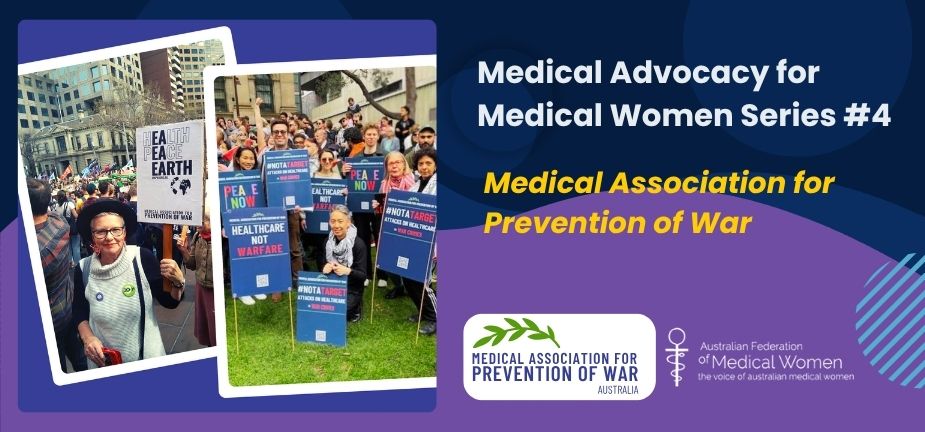In this article, originally published by in the RACGP’s newsGP, AFMW President, A/Prof Magdalena Simonis shares opinion on how delisting some popular HRT (Hormone Replacement Therapy or MHT) medications from PBS is a gender issue, not a fiscal one.
Around 10% of post-menopausal female population are prescribed MHT for very severe symptoms which impact their quality of life and their ability to participate in activities fully,’
Menopause is a time which often coincides with the “meat in the sandwich” phase of life for women, who are often still working full time, have adult or teenage children who are dependent due to school or university and have ageing parents.
Experts warn the proposed delisting of medications will not only impose cost-related issues, but potentially affect quality of life.
Three types of hormone transdermal patches containing estradiol, or estradiol with norethisterone, (Estradot, Estalis Continuous and Estalis Sequi), will potentially be removed from the Pharmaceutical Benefits Scheme (PBS) later this year.
newsGP understands the supplier, pharmaceutical company Sandoz, has been providing these products at the PBS-agreed price at a loss for some time.
An application to delist Estradot and Estalis from the PBS was submitted earlier this year and approved by the Pharmaceutical Benefits Advisory Committee (PBAC). Sandoz will make an application for an increased price later in the year but, if rejected, the products will be delisted from the PBS.
Transdermal hormone therapy patches are commonly prescribed for menopausal women as menopausal hormone therapy (MHT).
The Australasian Menopause Society (AMS), RANZCOG and Endocrine Society of Australia have written to Federal Health Minister Greg Hunt as part of advocacy efforts to ensure all Australian women continue to have access to the PBS-subsidised treatments.
AMS President-elect Dr Karen Magraith told newsGP that MHT is an important treatment option and the combined estradiol and norethisterone patches – the only combined transdermal option available in Australia – offer many benefits.
‘With regards to the estradiol patches, although there are two other PBS-listed transdermal estradiol options – a patch and a gel. These options do not provide the dosage flexibility that Estradot provides and don’t suit all women,’ she said.
‘MHT is especially critical for those with early menopause or premature ovarian insufficiency, for whom it provides protection from premature cardiovascular and bone disease. Transdermal patches are also used by women with pituitary and other endocrine conditions, and by transgender women.
‘Furthermore, taking oestrogen orally can increase the risk of venous thromboembolism, but absorbing oestrogen through the skin generally does not.’
The letter to Minister Hunt outlines that the decision to remove the medicines will not only impact postmenopausal women aged over 45, but also those with early (before age 45) or premature (before age 40) menopause, which is estimated to affect up to 12% of women.
Dr Magraith is concerned the removal of the patches from the PBS will reduce MHT options, and particularly disadvantage those who are on low incomes who often cannot afford to buy the treatment on private prescriptions.
‘I really see it as being an issue of equity of access to treatment because it still going to be available in Australia for women to purchase the products listed, but for women on healthcare cards who normally get their scripts for around $6.60, they will potentially be unable to afford them,’ she said.
The price increase in the application ranges from $7.35 to $24 per script on the PBS, with the private prices expected to rise to $30–40 per month.
‘There is potential for quite a significant price increase,’ Dr Magraith said.
‘If the [increased] PPS price is approved, it will result in women losing out either way, because women without concession cards will pay a higher price. There’s nothing much you can do about that.’
Women’s health GP Associate Professor Magdalena Simonis agrees the proposed delisting represents more than a financial issue.
‘This is a gender equality issue, not just a fiscal discussion and [the Government] needs to observe that this is another … opportunity to show their support for women and accept that hormone-replacement therapy comprises only a small cost to the PBS,’ she told newsGP.
‘On the other hand, the cost of compromising access to PBS-listed MHT for women across all socioeconomic spectra was seen back in 2002 with the erroneous media coverage of the Women’s Health Initiative study, which resulted in 67% of women withdrawing from taking prescribed MHT and many needing to replace this with costly non-PBS-listed alternatives and antidepressants.’
Associate Professor Simonis believes the delisting would have ‘serious implications’.
‘Because the 10% of the post-menopausal female population who is prescribed this takes it for very severe symptoms which impact their quality of life and their ability to participate in activities fully,’ she said.
‘Menopause is a time which often coincides with the “meat in the sandwich” phase of life for women, who are often still working full time, have adult or teenage children who are dependent due to school or university and have ageing parents.’
For GPs prescribing MHT, Dr Magraith believes the delisting will bring further hurdles.
‘GPs already find menopause a challenging and complex area of practice. Reducing the options readily available makes it more challenging and may reduce GP confidence in managing menopause,’ she said.
‘Trying to work out what options they can use for their patient adds more pressure to consultations that are already under time pressure.
‘We already know that many women with menopausal symptoms and without contraindications to MHT are not offered MHT, and now even more women may miss out on the opportunity to have this treatment.
‘This relates to all women, but is especially relevant for women with premature ovarian insufficiency for whom hormonal treatment is important.’
The COVID pandemic has affected the supply of many medications, including some hormone-replacement therapies. For women on MHT, these shortages presented challenges in finding replacements for the therapy that suited them.
‘Often at a higher cost, a huge inconvenience of breakthrough symptoms, or distances travelled or being without medication for an extended period of time,’ Associate Professor Simonis said.
‘The COVID-19 pandemic has caused many big companies to review their costs and profit margins and … fortunately Sandoz has taken a positive step in responding to the request to repeal their submission and refer it back to the PBAC for decision for a price increase, which the Government will need to carry.’
Originally published: https://www1.racgp.org.au/newsgp/professional/serious-implications-if-menopause-treatments-remov
Associate Professor Magdalena Simonis AM is a Past President of the AFMW (2020-2023), former President of VMWS (2013 & 2017-2020) and current AFMW National Coordinator (2024-2026). She is a full time clinician who also holds positions on several not for profit organisations, driven by her passion for bridging gaps across the health sector. She is a leading women’s health expert, keynote speaker, climate change and gender equity advocate and government advisor. Magda is member of The Australian Health Team contributing monthly articles.
Magdalena was awarded a lifetime membership of the RACGP for her contributions which include past chair of Women in General Practice, longstanding contribution to the RACGP Expert Committee Quality Care, the RACGP eHealth Expert Committee. She is regularly invited to comment on primary care research though mainstream and medical media and contributes articles on various health issues through newsGP and other publications.
Magdalena has represented the RACGP at senate enquiries and has worked on several National Health Framework reviews. She is author of the RACGP Guide on Female Genital Cosmetic Surgery and co-reviewer of the RACGP Red Book Women’s Health Chapter, and reviewer of the RACGP White book
Both an RACGP examiner and University examiner, she undertakes general practice research and is a GP Educator with the Safer Families Centre of Research Excellence, which develops education tools to assist the primary care sector identify, respond to and manage family violence . Roles outside of RACGP include the Strategy and Policy Committee for Breast Cancer Network Australia, Board Director of the Melbourne University Teaching Health Clinics and the elected GP representative to the AMA Federal Council. In 2022. she was award the AMA (Vic) Patrick Pritzwald-Steggman Award 2022, which celebrates a doctor who has made an exceptional contribution to the wellbeing of their colleagues and the community and was listed as Women’s Agenda 2022 finalist for Emerging Leader in Health.
Magdalena has presented at the United Nations as part of the Australian Assembly and was appointed the Australian representative to the World Health Organisation, World Assembly on COVID 19, by the Medical Women’s International Association (MWIA) in 2021. In 2023, A/Professor Simonis was included on the King’s COVID-19 Champion’s list and was also awarded a Member (AM) in the General Division for significant service to medicine through a range of roles and to women’s health.










